If you have just started a consulting business or you are now looking to scale it, you are well aware that finding the right leads is not always the most exciting part. One of the most effective lead generation tactics to bolster your consultancy leads database is by using quizzes like knowledge tests.
Knowledge tests are quite popular in many marketing arsenals simply because people love getting tangible and concrete results that validate their knowledge base. In BuzzSumo’s 2015 study of quizzes, it was revealed that quizzes get shared 1,900 times on average.
But creating knowledge tests can be a bit daunting. There are so many knowledge test templates available on the web, promising to bring results. Even so, a cookie-cutter solution just doesn’t do it.
In this article, I will give you some guidelines to help you create effective knowledge tests specifically for your consulting business. But before that.
What is a knowledge test?
A knowledge test is an interactive content designed to gauge a person’s understanding of a certain subject. In modern marketing, it is mainly used to engage and entertain an audience, but ultimately the end goal is to attract leads and sometimes qualify a potential customer.
Knowledge tests for collecting consultancy leads
People who are serious about professional development and who are looking to scale their industry knowledge, a.k.a. your potential clients, want to validate their knowledge base most of the time. Putting their knowledge to the test makes knowledge tests extremely useful and easy to collect consultancy leads.
According to the Content Marketing Institute’s (CMI) 2016 study of interactive content, the use of quizzes as a lead magnet in the early stage (awareness/discovery stage) is most efficient. And you can also take advantage of this to qualify your audience and evaluate how cold or warm your leads are.
In the end, you should be able to segment your audience automatically, without sifting through hundreds or probably thousands of answers, and instantly match them up with your customer personas. That way, you know which product or service fits them best and how to tailor your message.
How to create knowledge tests to collect consultancy leads
Knowledge tests are known to be the most boring type of quiz, but they don’t have to be. Here’s a step-by-step guide on how to create engaging knowledge tests to attract the right leads for your consulting business:
Step 1: Choose the right topic
Choosing the right topic may sound pretty obvious and a piece of cake, but it’s something you have to pay extra attention to. Pick the wrong topic, and you’re off to a bad start.
When looking for the right topic, put yourself in the shoes of your target clients. What do you think they are interested in?
Avoid broad topics as much as possible. Instead, customize your test to match your target audience’s interests. Your chances to attract the right people will be much more significant, even if the group isn’t big.
Step 2: Create a title that piques curiosity
We all took a knowledge test or two at some point. Remember why you clicked the irresistible “Take quiz” button? Right. Curiosity. We all love to see how our knowledge stacks up.

A great title is your hook responsible for making someone click the button. You want to create a title that’s not only interesting but also lures your audience to give your quiz a try.
When creating a curiosity-evoking title, you may use assertive words like ‘actually’ and ‘really.’
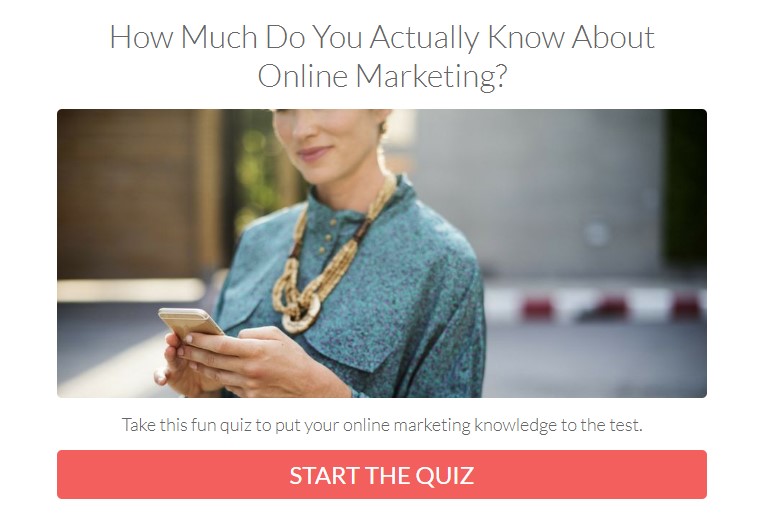
In textual content, using too many adverbs like ‘actually’ and ‘really’ is generally frowned upon because they often dilute the effectiveness of a sentence. But using it in the title is something you should not be afraid of. In fact, these words make your titles more powerful and emphatic.
For instance, the title “How Much Do You Actually Know Your Business?” sounds so much better than without the word ‘actually.’ By adding ‘actually’ in your title, you are turning what seems to be a bland everyday question into something that summons your audience to an intriguing knowledge challenge.
Step 3: Pick the right questions
Creating test questions can be the most challenging part of your knowledge test, especially if it’s your first time. But if you know your target audience really well, you should be able to come up with questions that matter to them the most.
Some tips for picking the right questions:
Use questions that allow for automatic evaluation
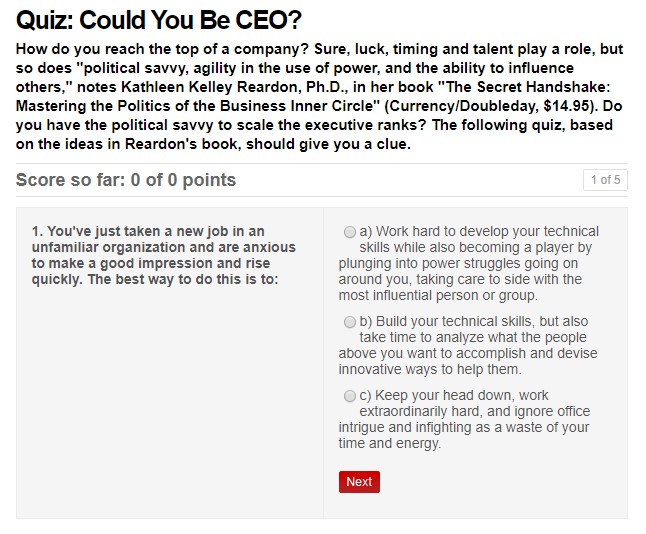
On the other hand, you want to steer clear of debatable questions by all means. And avoid using one type of question only throughout your quiz as this will become monotonous.
Use lead-qualifying questions
Use a question or two to capture valuable, lead-qualifying insights. But be strategic and discreet about it. Be careful because too many of these kinds of questions might bore your audience. Remember, you are creating an engaging knowledge test, not another tedious survey on the internet.

By using lead-qualifying questions, you can also personalize your content based on your audience’s answer, given your audience agreed to sign up for whatever you are offering.
Keep it short and simple
Clarity is of utmost importance in quizzes. You don’t want to confuse your audience with long sentences. And you don’t want to overwhelm them with too many questions. Your quiz should only take 2-3 minutes to finish, or about 5 to 10 questions. The shorter, the better. Inject some personality in your questions, but don’t be overbearing.
Step 4: Design a lead capture
In your lead capture form, you could include name, company, website, country, and of course, email address or contact number. Email address and maybe even first and last name is actually enough. The fewer input fields, the better.
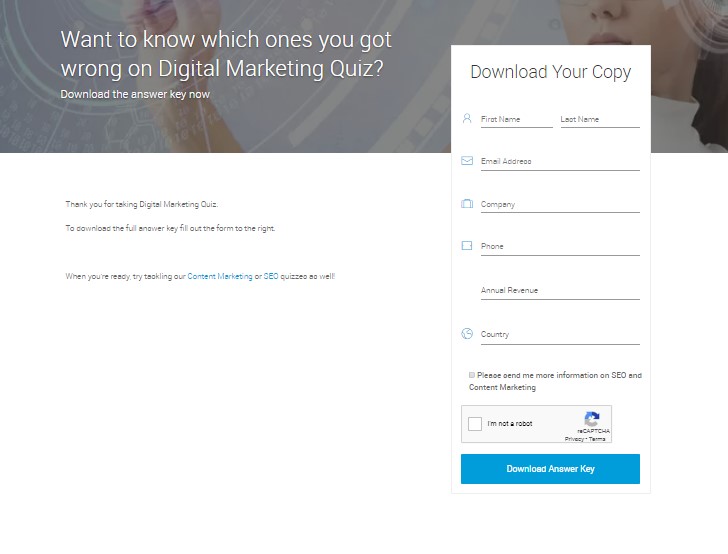
There are different ways to go about gating your knowledge test and collecting consultancy leads. Your lead capture may go before your knowledge test starts or before showing the results. The latter is more commonly used as it reduces the risk of objection.
In such a case, you can either show the results immediately after your leads give their credentials or send them the test results or answer key via their email. The latter may seem less intuitive, but it’s a great opportunity for you to occupy a space in your audience’s inbox (and make sure you are not in the spam box) and ignite a meaningful conversation.
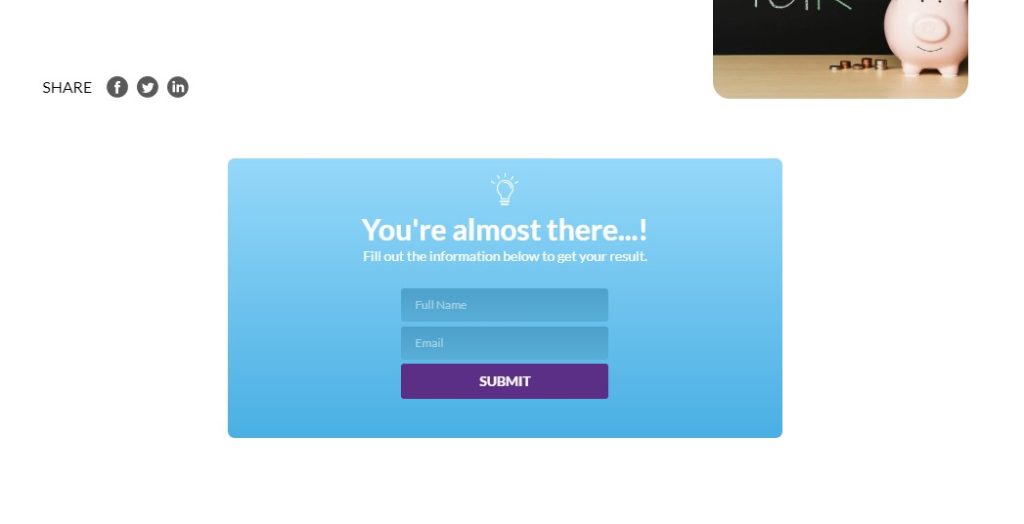
There’s no harm in putting your lead capture right in front of your test, as long as your quiz is of high value.
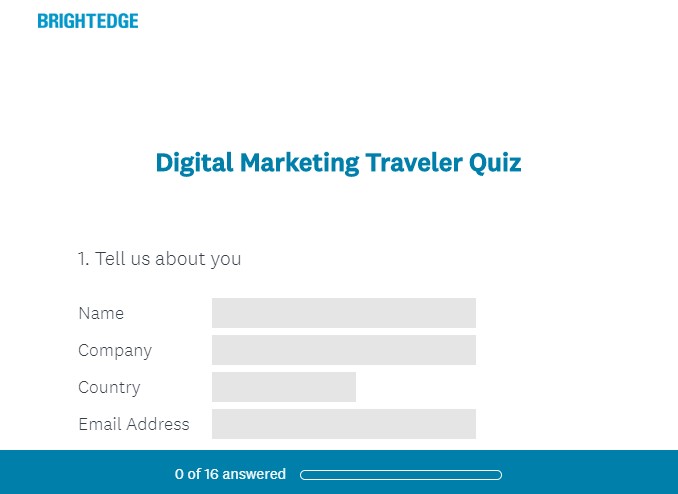
To spice up your lead generation, you can add another incentive on top of the test results. It could be a free ebook, a discount code, a free coaching call, a free consultation, an entry to a giveaway contest, etc.
But above all, be transparent with how you will use their email addresses. You can put a checkbox for newsletter opt-in or at least a link to your privacy policy.
Step 5: Design share-worthy results
Now it’s time to deliver the results. This is the perfect opportunity to promote products/services and drive traffic to your website. So you want your results section to be worth-sharing.
Here are some tips for designing share-worthy results:
Create an actionable headline
You’ve probably noticed that most headlines of shared quizzes go something along the lines of “I am Einstein. What are you?” or “I got 10/10. Do you know your score?” This is good to showcase the taker’s results and invite other people to take the test at the same time.
Include a call-to-action (CTA)
Add a compelling CTA to reinforce the headline. For instance, “Take this quiz to discover your type” or “Take this test to know your score.”
Use an attention-grabbing image
Include a striking image that matches the results you give. It’s sometimes the first thing that draws attention other than the headline, so it pays to leverage this to maximize the exposure of your quiz.
Include share buttons
Your results page should also include a share button so takers can easily spread their results across social media networks.
Be positive
People take knowledge tests to validate themselves, right? When delivering the results, it’s important to highlight the positive to make your audience feel good about the results. But be honest if they did badly. Don’t be afraid to include some constructive criticisms at the end.
Conclusion
Whether it’s for gauging their knowledge, entertaining themselves, or benchmarking their careers, your audience will always find value in anything that gives them scores, feedback, or advice.
Knowledge tests are a powerful interactive content perfect for generating consultancy leads and qualifying those leads. No question about that. All that’s left to do now is to promote your knowledge test and make it a lead-generating machine.
Is there anything that frustrates you in your lead generation efforts? I’d like to hear it in the comments.





